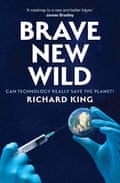Aldous Huxley’s Brave New World describes a society in thrall to the values of science and technology. It is set in the futuristic World State, whose citizens are scientifically engineered to fit into a hierarchy. Eugenics, psychotropic pharmaceuticals and classical conditioning are employed to maximise stability and happiness. Huxley’s novel does not describe a conventionally authoritarian system, but one in which the desire for freedom and dignity has simply been eliminated. The World State is a radical technocracy.
It’s a satire on the consequences of importing scientific thinking into the realm of social policy. The Controllers of the World State preside over a society that has rationality and efficiency as its guiding principles, and when those principles conflict with human nature, it is human nature that is required to give way. Rather than building a society that engenders happy human beings, the Controllers seek to design human beings that can function in the society into which they are “hatched”.
The idea that we would invert our relationship with the world in this way strikes us as sinister, as antithetical to what it means to be human.
And yet something resembling this upside-down mindset is now emerging across the globe, particularly in the debate around climate change.
Having built a system that is destructive of the environment that surrounds and sustains us, we are now proposing to change … the environment! In his dystopia Huxley imagined a society that only worked when the humans within it were made into something not quite human. Today, many scientists and engineers imagine a planet that has been similarly transformed: nature itself must yield to the system. We need a technological fix.
Driving us towards this technological fix is the damage inflicted by existing technology.
The powerful datacentres needed to provide artificial intelligence demand huge amounts of energy – a demand that will increase as the white-hot rivalry between the US and China becomes hotter still. And so it is hardly surprising to find the Silicon Valley faithful at the head of a campaign to revive and reinvent the nuclear power industry, or to find that this technology – the first in human history to reconstitute nature’s basic elements – has a kind of totemic power among those who would rely on technology to address the environmental crisis. The last two years have seen a huge recommitment to nuclear energy, with more than 120 energy and tech companies, 25 countries and 14 major financial institutions announcing their support for its expansion and development.
From liberal Europe to communist China, the technology that threatened to destroy the planet is held to be the one that will save it.
But ecomodernism is far more heterodox, and far more radical, than this “nuclear renaissance”.
Take geoengineering, for example: the proposal to manage planetary temperatures, either by reducing greenhouse gases by sucking them out of the atmosphere and burying them deep beneath the oceans, or by reflecting sunlight back towards space. One popular proposal involves pumping sulphates into the upper atmosphere to imitate the sun-dimming effects of a large volcanic eruption, reducing the amount of solar radiation getting trapped by the greenhouse gases, but not the gases themselves. (You know the situation is serious when your proof of concept is Krakatoa.) Again, the avatars of big tech have placed themselves at the head of these schemes. And again, they are moving ahead with such technologies whether we are happy about it or not, performing sulphate experiments in the skies above California (too late for the Palisades, alas) or fertilising the oceans with iron dust in order to kickstart algae blooms that draw down carbon from the atmosphere.
Sign up: AU Breaking News email
What else can we look forward to, in this technologically managed future? As biotechnology, nanotechnology and artificial intelligence converge into a technoscience of remarkable power, the answer to that question boggles the mind; but even now there are signs that the future could witness an unparalleled revolution in the relationship between human beings and the non-human world.
And all this is before we’ve broached the issue of mining the moon, or even asteroids, for water and precious minerals.
In all kinds of ways, then, we are on the precipice of a transformation – one that will reverse our relationship with the world in a way analogous to Huxley’s great satire. In the absence of any serious discussion about social and political transformation, we are doubling down on technological innovation. We are entering a Brave New Wild.
The problem with the technofix mindset is that the very thinking that brought us to this juncture is now assumed to offer a path to safety. The environmental problems we face are deeply related to technology, and yet it is to technology that we turn for solutions. The cause is re-engineered as a cure.
Many scientists reject this position as simplistic. They argue (not without some justice) that it is the irresponsible use of technology that is dangerous, and that the best way forward is to instil a new ethos of responsibility in our future endeavours. Technologies, they say, are “only tools” and have no moral content as such. I can use a hammer to drive in a nail or bludgeon my nextdoor neighbour to death. It is my actions that matter, not the hammer itself.
This is the instrumental view of technology, and it is dominant in scientific circles and even in mainstream environmentalism. But it fundamentally misunderstands the nature of humanity’s relationship to technology. That relationship is inevitable: there is no Homo sapiens without technology.
Having evolved from tool-using hominids, humans depend upon technology in a way that no other species does. To take an instrumental view of that relationship, however, is simplistic and ultimately dangerous, as it underplays the shaping effect that powerful technologies have on human sensibilities. If all you have is that hammer, every problem becomes a nail.

The technofix is just as much a psychosocial phenomenon as a scientific and engineering challenge. We need to ask what kind of relationship we want with the planet we call home, as well as with the technologies through which we now propose to change it.
This is not an argument against technological innovation. Any response to climate change and the environmental crisis more generally will have to make use of new technologies, such as solar panels and wind turbines, and more efficient batteries for energy storage. But in order to make the best use of these innovations, we will need to insist on the crucial difference between approaching such technological interventions as part of a broader project of change and merely thinking technologically – and technocratically – about the problem of climate change.
We need to push back against the instrumentalist, techno-capitalist worldview and do so in a language that places humanity – what it is, what it needs – at the centre of our thinking.
-
This is an edited extract from Brave New Wild by Richard King, out now through Monash University Press

.png) 1 month ago
37
1 month ago
37

















































